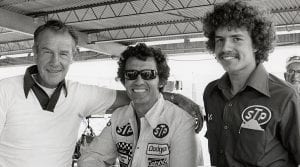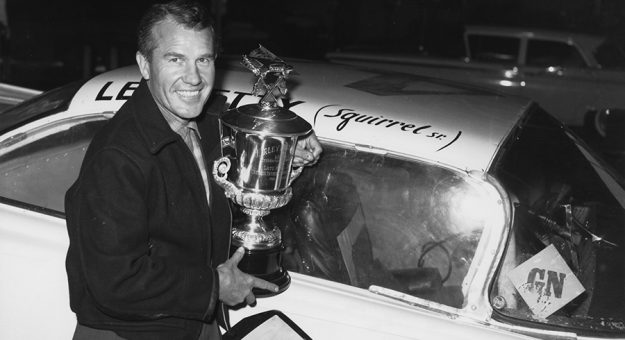From 1950 through ’53, Lee Petty logged 117 starts, 10 victories, 67 top-five finishes and 91 top-10 results. In 1954, Petty won his first NASCAR Cup Series championship, followed by repeat championships in 1958 and ’59. He never finished lower than sixth in points during his 12-year NASCAR career. Lee Petty amassed 54 victories before his retirement in 1964.
“He was the smartest driver I had ever seen,” Richard Petty said in the documentary “Petty Blue.” “He would run hard one weekend and wouldn’t run hard the next weekend, but he would win both weekends. He didn’t drive for someone else. He drove for a living. If he didn’t finish that race, we might not get to that next race.”
To make a living from racing stock cars, Lee Petty had to run a very conservative operation from start to finish.
“We had to win, especially in 1949 and 1950, that’s the truth. We were lucky to have enough gas and food to get to the race track,” Lee Petty said in “Petty Blue.” “I drove the race car to the race track. I drove the car all the way to California to race. Everywhere. I drove it all the way to New York and raced it and all the way to Canada. We didn’t have luxuries at all.”
Sometimes the trip home from the races could be challenging.
“I remember we were racing in West Palm Beach, Fla., one year and Lee and his family came to the race track in the car he was going to race that weekend,” said 1960 NASCAR champion Rex White. “Lee flipped during the race and the car was in really bad shape. The windshield was gone, the roof was all bowed out and the doors didn’t fit. But after the race, they put their spare tires and jack and spare parts back in that car and drove it back to Level Cross without a windshield. This was in the wintertime and that had to be one cold trip back to North Carolina.”

During the 100-mile qualifying races prior to the 1961 Daytona 500, Richard Petty and Lee Petty were injured in separate crashes. Richard Petty was injured when his No. 43 Oldsmobile left the track over the first-turn wall. As he was leaving the infield hospital, Lee Petty suffered a head injury, a punctured lung and broken ribs in a crash with Johnny Beauchamp. The elder Petty was hospitalized for four months.
Richard Petty, 23, and Maurice Petty, 21, kept Petty Enterprises going. Lee Petty returned to Level Cross to run the company, building it into a winning organization. The team’s record of 268 victories was surpassed when Kyle Larson won May’s Coca-Cola 600 at Charlotte Motor Speedway, giving Hendrick Motorsports its 269th Cup Series triumph.
“Lee understood his car and his equipment,” said Dale Inman, the legendary Petty Enterprises crew chief and cousin to the Pettys. “If it was a rough track, he knew what it would take to win. He was a good driver from that standpoint. He knew he had to finish to make money. Racing was a business to him to pay for his everyday living and to eat. Some of the tracks were ridiculously rough. He was good at making his cars last because he was the one that would repair them to race. He was a businessman. He had to enjoy it to a certain degree, but he also had to feed his family and make it work and help them survive and meet their everyday needs.”
Kyle Petty said his grandfather had a philosophy that lasted until Petty Enterprises closed in 2008.
“Lee Petty’s stuff very, very rarely broke. Preventive maintenance. Preventive maintenance. Preventive maintenance,” Kyle said. “When they dropped the green flag every week, you didn’t beat yourself. You might get beat, but you don’t beat yourself. My granddad could care less if they gave him a trophy if he won a race. As long as he could go to the pay window and get that paycheck or better yet that cash, he was a happy man. Richard Petty was 180 degrees different. Honest to goodness, if they were going to give a bucket of chicken to the winner, Richard Petty would run harder for that because that was the trophy. He didn’t care about the money. He was more concerned about the trophy. They were total opposites when it came to that.”
One of the most-decorated drivers in motorsports history, Lee Petty died on April 5, 2000.
